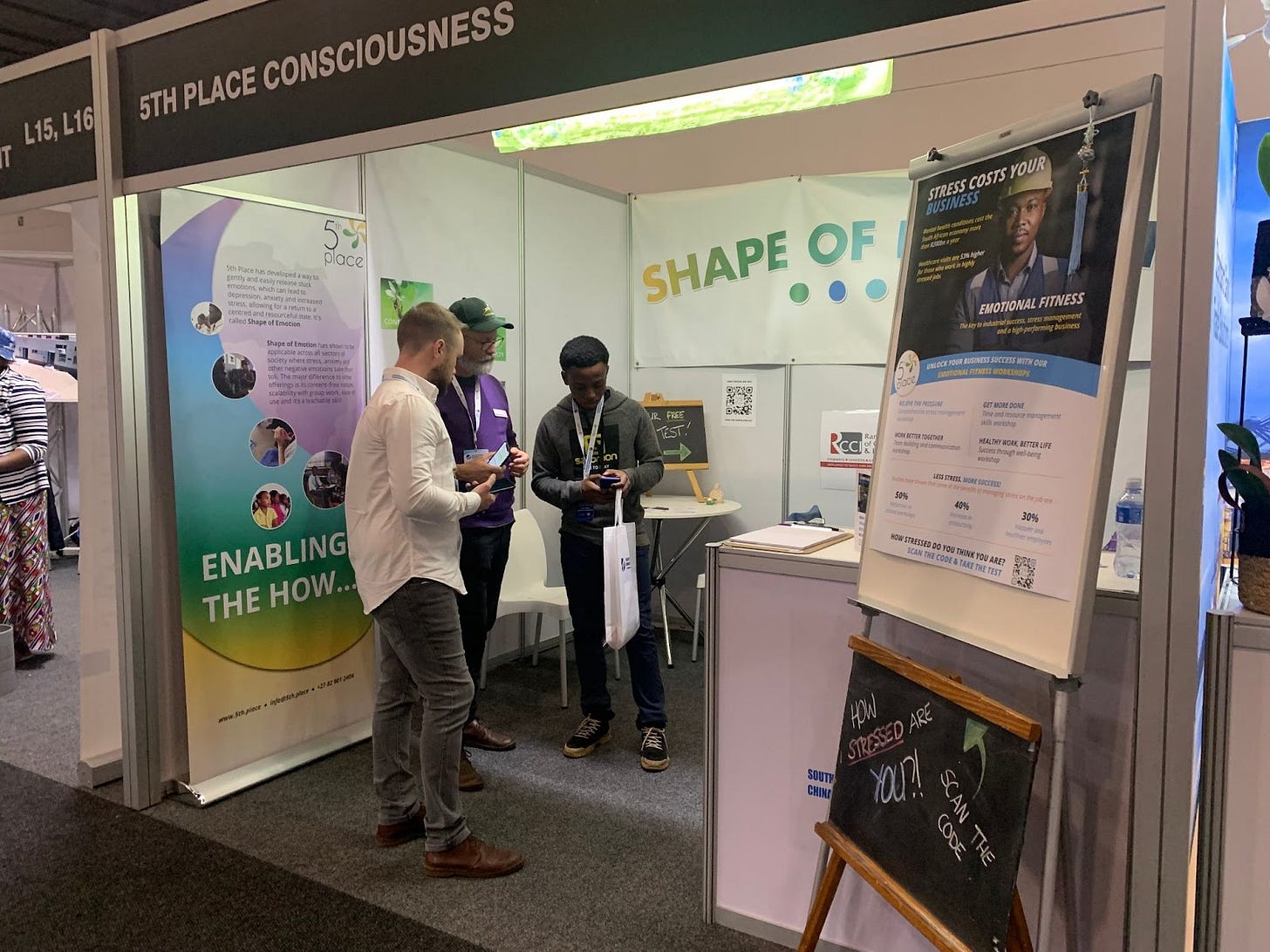White men don't stress
Engaging with all kinds of people at an Expo, talking about stress and how to manage it, as white men walked by, you would have sworn that white men don’t stress!
Enabling The How #137. Reading time: 4 minutes 45 seconds
White men don’t stress. Of course they do but by their singular avoidance of our stand at the trade show we exhibited at last week one would expect that stress was not something they encounter nor need to address.
We were gifted a stand at the South African International Industrial Expo, care of the Randburg Chamber of Commerce and Industry. What does a company focused on mental and emotional wellbeing do at an Industrial Expo, you ask? We talk about stress. We market our stress management programmes including our online one day stress management workshop.
Positioned between a major “blue” bank on the one side and the Gauteng Department of Economic Development on the other, the poster declaring “Stress costs your business” stopped people in their tracks. It beckoned them closer to read the somewhat uncomfortable stats:
Mental health conditions cost the South African economy more than R200bn a year.
Healthcare visits are 53% higher for those who work in highly stressed jobs.
Everyone is stressed
We heard stories about how stress had caused diabetes, heart problems and a stroke. We heard about how friends, relatives and colleagues were “in trouble” battling with depression or anxiety as a result of the stress from the past few years.
“Yoh, stress!” said one woman from Botswana, “Everyone is stressed, no?”
Many, many are. Except white men. They looked the other way and marched right on.
We are intimately aware of the stigma and taboo surrounding mental and emotional health in this country. However, it is in our experience that South African white men, in particular, prefer not to talk about their feelings and emotions. They will seldom admit they get anxious or depressed and certainly would rather reveal that they have diabetes or a heart condition before admitting that they feel anything on an emotional level.

Emotions underpin everything
Emotions underpin everything we do. We are not rational beings who are emotional, we are emotional beings who can be rational. But because emotions are messy and difficult to control we stamp them away and pretend they don’t exist. And then wonder why we get sick.
Normalising the space and opportunity to speak about how we really feel is a vision we have for the world. It’s not about digging up the dark and painful, or marinating in negative emotions. We all know at least one Eeyore with a perpetual pessimistic perspective that seeps into all they say and do. That is a downer that nobody needs in their ether.
Just being able to say “I’m not feeling that great today,” and having it accepted without the drive to fix or make better, is what we are aiming at. It’s okay not to feel great, it doesn’t define us and it is only a feeling. It will pass - if we allow it to.
Gratitude builds emotional fitness
When we speak about emotions we tend to focus on the negative and difficult ones. We forget that supportive, positive emotions count too. In fact when we purposefully and intentionally evoke supportive emotions it sets off a domino effect that sparks more uplifting emotions.
One such emotion is gratitude. The super power we focused on at our final session of the Emotional Fitness Super Power Programme. Research has shown that consciously practising gratitude can reduce feelings of stress and anxiety. In fact, studies have found that a single act of thoughtful gratitude produces an immediate 10% increase in happiness, and a 35% reduction in depressive symptoms.
Gratitude is also a protective factor, which means it protects us by building emotional fitness so that we are able to handle difficult times better. Take a moment to connect to those things that you are grateful for. Feel what it feels like to be thankful. Notice the shift in your body.

Building a gratitude practice
When we, Matthew and Chantal, connect to those things, events and people we are thankful for we feel a rush of warmth that spreads over our body, lifts our spirits and fills our hearts. That extra layer of light shines away the dark and dreary. It feels good, and makes the day appear shinier and brighter.
Building a gratitude practice as another way to sustain emotional fitness. The range of ways to do this include starting a gratitude jar or gratitude journal, daily prayers and saying grace before meals, celebrating small victories, remembering to acknowledge, affirm and appreciate someone, and doing simple acts of kindness.
When we purposefully turn our minds towards the good in our lives, it rewires our brain and sets us up for more good. As the saying goes: energy flows where attention goes. We would prefer that energy to be generative, to bring the light and for us to close the circle by being eternally grateful for it.
Until next time.
Yours in feeling,
Chantal & Matthew
At my core I am perfect
At 5th Place we believe that at our core we are perfect.
What is needed is to clear away the debris of the difficult feelings collected and built up over the years. When this is done, the godlike qualities are uncovered, qualities such as compassion, kindness, community and love that sit at the centre of who we really are.
At my core I am perfect. Beautiful, complete, flawless, whole, intact, just right, great, wonderful. Perfect!
Explore more of 5th Place’s principles







